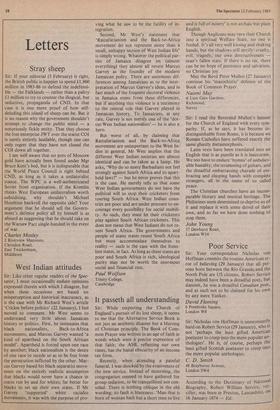West Indian attitudes
Sir: Like other regular readers of the Spec- tator, I must occasionally endure opinions expressed therein with which I disagree, but when these occasions are based on misperception and historical inaccuracy, as is the case with Mr Richard West's article `Cricket before politics' (22 January), I feel moved to comment. Mr West seems to understand very little about Jamaican history or politics. First, he insinuates that
black nationalists, Back-to-Africa movements, and Marcus Garvey wanted 'a kind of apartheid on the South African model'. Apartheid is forced upon one race by another; black nationalism is the desire of one race to secede so as to be free from the persecution inflicted by the other. Mar- cus Garvey based his black separatist move- ment on the entirely realistic assumption that blacks would never have a chance in states run by and for whites; far better for blacks to set up their own states. If Mr Garvey `supported' white racialist movements, it was with the purpose of pro- ving what he saw to be the futility of in- tegration.
Second, Mr West's statement that Itastafarianism and the Back-to-Africa movement do not represent more than a small, unhappy section of West Indian life' is simply wrong. Whatever the political par- ties of Jamaica disagree on (almost everything) they almost all revere Marcus Garvey as the founder of the modern Jamaican polity. There are enormous dif- ferences among Jamaicans as to the inter- pretation of Marcus Garvey's ideas, and in fact much of the frequent electoral violence in Jamaica stems from these differences, but if anything this violence is a testimony to the central role that Garvey played in Jamaican history. To Jamaicans, at any rate, Garvey is not merely one of the 'dot- tier West Indian nationalists' — he is also a hero.
But worst of all, by claiming that Rastafarianism and the Back-to-Africa movement are unimportant to the West In- dies in general, Mr West implies that the different West Indian societies are almost identical and can be taken as a lump. He asks, 'Why do so many Barbadians not feel strongly against South Africa and its apart- heid laws?' — but he never proves that this is the case. He merely tells us that some West Indian governments do not have the political will to stop their cricketers .from touring South Africa. West Indian coun- tries are poor and are under pressure to en- courage every possibility for social mobili- ty. As such, they must let their cricketers play against South African cricketers. This does not mean that West Indians do not re- sent South Africa. The governments and people of many states resent South Africa but must accommodate themselves to reality — such is the case with the front- line states, in fact. As long as these states are poor and South Africa is rich, ideological purity may not be worth the enormous social and financial cost.
Paul Wolfson
Trinity College, Cambridge






































 Previous page
Previous page